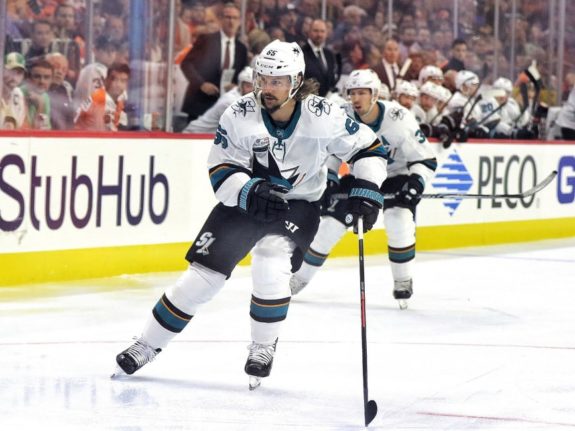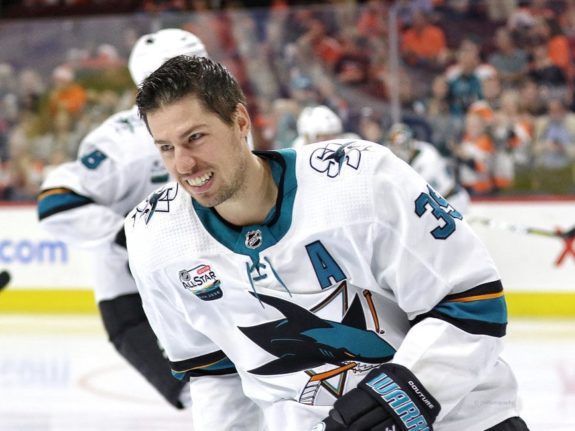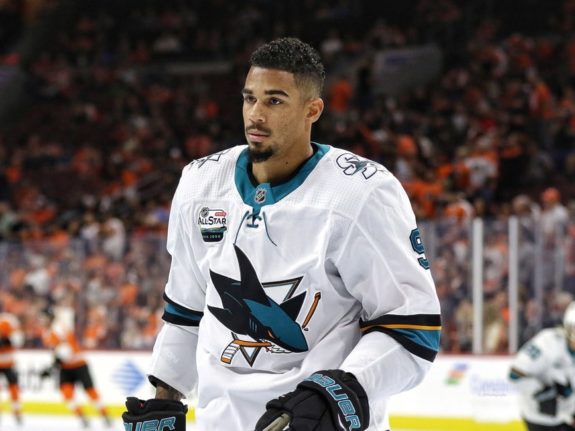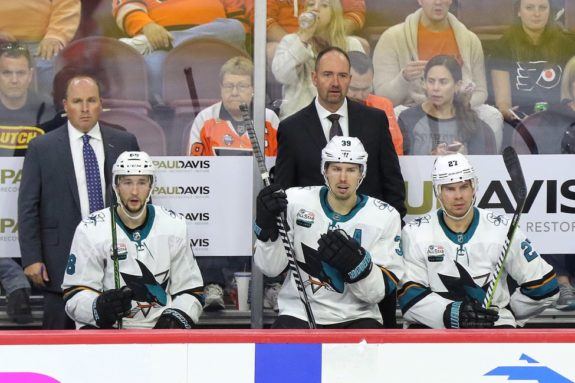It happened quickly. The San Jose Sharks and Calgary Flames were battling for first place in the Western Conference with less than a month to go in the season. The Sharks were winning and the schedule had turned less-than-daunting for the rest of the way. It looked as if they were the juggernaut others would have to overcome.
Less than a month later, the Sharks look like first-round playoff fodder with modest hope, lowered expectations and a fanbase where a good portion seems to have already packed it in.
How did this happen?
Changes for the Sharks
The Sharks have undergone many changes this season. They started off modestly, as key players including Erik Karlsson and Marc-Edouard Vlasic struggled to get their game together. An early December loss to the cellar-dwelling Ottawa Senators represented a low point. Some reasonably believe that trip for Karlsson was his turning point. Until this season, Ottawa was the only NHL home he’d known and perhaps the game proved cathartic. Whatever happened in Ottawa, the Sharks’ season turned on a dime. They went on a tear for the next quarter of the season, going 16-3-2, with Karlsson playing like an MVP.

By mid-January, the Sharks were an elite team on a major roll. Shortly before the All-Star break, Karlsson injured his groin. By the time the All-Star Game rolled around, a tired Sharks team had lost three of their last four. The timing of the break was perfect and a re-energized team took the ice in early February. Though Karlsson continued to miss time after the break, the Sharks played well, including getting their best goaltending of the season.
The team posted an 8-3-1 record in February, despite a challenging schedule. March started off even better, the team won six straight and a road win over the Winnipeg Jets gave the team an impressive 43-19-8 mark, 94 points with a dozen game left. Given the relative ease of the remaining schedule (heavy with home games against weaker teams), the potential for a 110-point season and the top seed in the Western Conference were reasonable expectations.
It was then wheels came off. The Sharks went the next 10 games without a regulation win, only ending the downturn against a lowly Edmonton Oilers team playing their back-up netminder and with three rookies skaters in the lineup. The season finale against the Colorado Avalanche provided another win, though both teams played it safe. How safe? A week earlier, the Sharks played the Vegas Golden Knights and the teams combined for 80 hits. The Sharks and Avalanche combined for just 21.
Sharks Excuses?
Though some will dismiss this, there were reports of a flu-like bug running through the locker room. While it may seem an excuse, I’m not ready to write it off. The team dragged physically and mentally. This is exactly the sort of result I’d expect from a team playing with multiple players under the weather. To be clear, there was something. One could hear it in raspy-voiced interviews, such as with Logan Couture.

I’ve voiced my share of criticisms of head coach Peter DeBoer, but as I looked at the Sharks during the downturn, they were playing a different system than the one DeBoer preaches. Indeed, there were plenty of times where Sharks players were doing things which didn’t resemble anyone’s system. The problems were at least as much mental as physical.
Sharks Injuries?
Some will cite the absence of Karlsson catching up with the team. Others will correctly note both Joe Pavelski and Evander Kane missed time. I’m not going there. The team is deep, and several of the teams who beat the Sharks had depleted their own rosters, either sitting veterans on game day or having traded away quality players. For example, the Los Angeles Kings sat Dion Phaneuf and Ilya Kovalchuk in their game against the Sharks after trading away Carl Hagelin and Jake Muzzin. Down four good NHL players, the Kings still beat the Sharks, 4-2.

Even missing some key talent, the Sharks can play with most anyone. But of the nine teams who beat San Jose in the latter half of March, six teams had no realistic chance at making the playoffs.
If it seems I’m discounting injuries, you are correct. Perhaps there are more injuries and they are more severe than we know. But San Jose looks like a team with mental fatigue issues and strangely enough, the playoffs might actually help. The Sharks travel a lot, they play a lot of back-to-back games and have a condensed schedule at times. They are not a team built for this. But it is not the way the playoffs work. There are no back-to-back games and much of the time, teams play consecutive games in the same venue. For a team reliant on older players, the playoff schedule is far more forgiving.
Upsetting the Golden Knights
The Sharks are the higher seed in their upcoming series against the Golden Knights in the opening round of the playoffs – and they are also the underdogs. On top of the Sharks playing poorly recently, the Golden Knights have had the Sharks number over the last two seasons. It wouldn’t surprise me if the Sharks pulled an upset, it wouldn’t surprise me if they were swept out.
To be blunt, this team does not look like it prepared well for what is next. I thought the coach would have set the line combinations and defensive pairings to prepare for the playoffs. It didn’t happened. For example, the coach changed all three defensive pairings between the second to last game and the last game. If he is trying to get players dialed in, this isn’t the way to do it. DeBoer also played pugilist Micheal Haley in both games on the fourth line, leaving more skilled players out of the lineup. It is hard to believe he’ll play the less-skilled Haley in the playoffs.

If a flu-like bug was the big problem in the Sharks’ March swoon, a lot can get better in a hurry. Timo Meier is a question mark after an injury suffered in the Edmonton game, but his return is both expected and important.
The unknown is Karlsson. He did play, albeit cautiously, in the win over the Avalanche. If he takes minimal time to shake off the rust and returns to full strength, the Sharks will be a lot tougher than they’ve looked recently. Fundamentally, there is no reason the Sharks cannot return to their midseason form. The question is: will they?